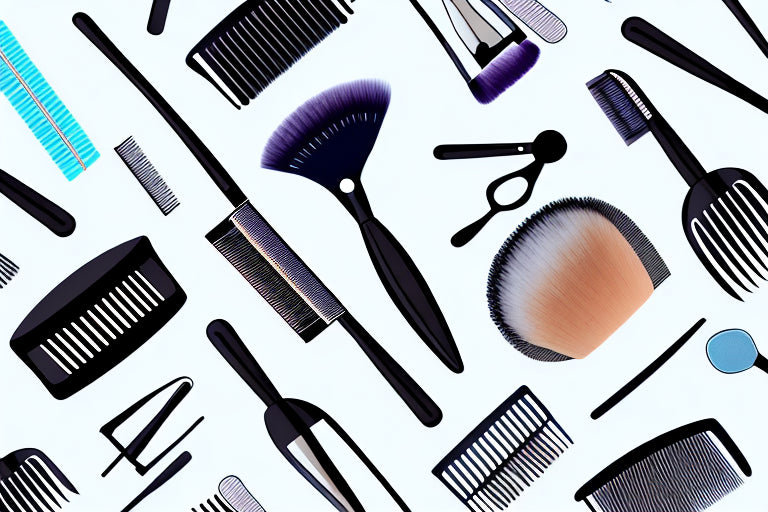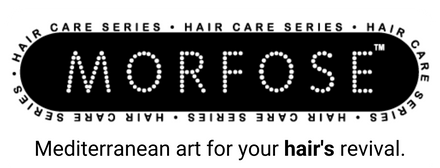Uncovering the Best Hair Care Secrets: Revealed!
Posted by MORFOSE COSMETICS

Uncovering the Best Hair Care Secrets: Revealed!
For many individuals, the state of their hair is a crucial part of their personal appearance and confidence. From straight to curly hair, everyone wants hair that looks and feels its best. While some people are naturally blessed with luscious locks, many others must put in extra effort to maintain the health and vitality of their hair. But don't worry, with the help of science and a few essential hair care tips, everyone can achieve their hair goals. In this article, we'll explore the most effective hair care secrets to reveal the best hair of your life!
The Science Behind Healthy Hair
Hair Structure and Growth
Before diving into hair care tips, it's vital to understand the structure and growth of hair. Hair growth occurs in three stages: anagen, catagen, and telogen. During the anagen phase, the active hair growth phase, the hair shaft pushes up and out from the hair follicle. In the catagen phase, the hair growth slows down, and the hair follicle starts to shrink. Finally, during the telogen phase, the hair follicle becomes dormant, and the hair eventually falls out.
The hair shaft consists of three layers: the cuticle, cortex, and medulla. The cuticle is the outermost layer which protects the hair shaft from external damage. The cortex, which makes up the majority of the hair shaft, provides strength and elasticity. The medulla, found only in thick hairs, is the innermost layer.
Factors Affecting Hair Health
Various factors affect hair health, including genetics, stress, age, and hair care routines. While we can't change our genetics and age, we have control over how we care for our hair and manage stress. Chemical treatments, such as coloring and perming, and over-processing can cause significant damage to hair, making it brittle and prone to breakage. Moreover, heat styling, such as blow-drying and flat-ironing, can also damage the hair shaft, leading to split ends and breakage.
It's important to note that hair health is not just about the hair itself. The scalp also plays a significant role in hair health. A healthy scalp provides a strong foundation for healthy hair growth. A clean scalp free of buildup and excess oil allows for proper circulation and nourishment to the hair follicles. On the other hand, an unhealthy scalp can lead to hair loss and thinning.
Additionally, diet and hydration also play a role in hair health. Consuming a balanced diet rich in vitamins and minerals, such as biotin, vitamin C, and iron, can promote healthy hair growth. Staying hydrated is also essential for healthy hair as dehydration can lead to dry and brittle hair.
Tips for Healthy Hair
Now that we understand the science behind hair growth and factors affecting hair health, here are some tips for maintaining healthy hair:
- Avoid over-processing and excessive heat styling
- Use a gentle shampoo and conditioner
- Massage the scalp to promote circulation
- Eat a balanced diet rich in vitamins and minerals
- Stay hydrated by drinking plenty of water
By following these tips and taking care of both our hair and scalp, we can promote healthy hair growth and maintain strong, beautiful hair.
Essential Hair Care Tips for All Hair Types
Proper Washing Techniques
The first step to healthy hair begins in the shower! When washing your hair, avoid using hot water, as it can strip your hair of its natural oils, leaving it vulnerable to damage. Use lukewarm or cool water instead. Be sure to massage your scalp gently with your fingertips to improve blood flow and stimulate hair growth. It's recommended to wash your hair every other day or every three days, depending on your hair type and level of activity.
Conditioning and Detangling
After shampooing your hair, it's essential to use a conditioner to replace lost moisture and protect your hair. Apply conditioner starting from mid-shaft to the ends, avoiding the roots, and let it sit for a few minutes before rinsing it out. To detangle your hair, use a wide-toothed comb or a detangling brush starting from the ends and working your way up to prevent breakage.
Drying and Styling
Avoid rubbing wet hair with a towel as this can cause hair breakage. Instead, gently blot your hair with a microfiber towel or an old t-shirt to remove excess water. If you must use a hairdryer, use the lowest temperature setting and hold it at least six inches away from your hair to avoid heat damage. To style your hair without heat, use rollers or flexi-rods for a more natural and healthier look.
The Role of Diet and Nutrition in Hair Health
Having healthy and beautiful hair is a dream for many people. But did you know that your diet plays an important role in the health of your hair? The food you eat provides the necessary nutrients and vitamins that your hair needs to grow strong and healthy. In this article, we will discuss the key nutrients for strong, healthy hair and the foods you should incorporate into your diet to promote hair growth.
Key Nutrients for Strong, Healthy Hair
There are several essential nutrients that your hair needs to grow strong and healthy. These include:
- Protein: Hair is made up of protein, so it's essential to include enough protein in your diet to promote hair growth. Foods like chicken, turkey, fish, and beans are excellent sources of protein.
- Iron: Iron is essential for healthy hair growth as it helps to carry oxygen to the hair follicles. Foods like red meat, spinach, and lentils are good sources of iron.
- Zinc: Zinc helps to keep the oil glands around the hair follicles working properly. Foods like oysters, beef, and pumpkin seeds are excellent sources of zinc.
- Biotin: Biotin is a B-vitamin that helps to promote healthy hair growth. Foods like eggs, almonds, and sweet potatoes are good sources of biotin.
- Vitamins A, C, and E: These vitamins help to combat oxidative stress and protect against damage. Foods like carrots, citrus fruits, and nuts are good sources of these vitamins.
- Omega-3 fatty acids: Omega-3 fatty acids help to strengthen hair follicles and prevent hair loss. Fatty fish like salmon and sardines are excellent sources of omega-3 fatty acids.
Foods to Incorporate into Your Diet
Now that you know the key nutrients for healthy hair, it's time to incorporate them into your diet. Here are some foods that you should consider adding to your diet:
- Leafy green vegetables: Leafy green vegetables like kale and spinach are excellent sources of iron and vitamins A and C.
- Fruits: Fruits like berries, oranges, and grapefruits are rich in vitamins A and C, which help to promote healthy hair growth.
- Fatty fish: Fatty fish like salmon and sardines are excellent sources of protein and omega-3 fatty acids, which help to strengthen hair follicles and prevent hair loss.
- Nuts: Nuts like almonds and walnuts are good sources of biotin and vitamin E, which help to promote healthy hair growth.
- Eggs and dairy products: Eggs and dairy products like milk and yogurt are excellent sources of protein and biotin, which are essential for healthy hair growth.
In conclusion, a healthy diet that includes the right nutrients and vitamins is essential for promoting strong, healthy hair. By incorporating the foods mentioned above into your diet, you can help to ensure that your hair stays healthy and beautiful.
Hair Care for Different Hair Types
Having healthy and beautiful hair is something that everyone desires. However, different hair types require different care to maintain their health and beauty. Here are some tips on how to take care of different hair types:
Straight Hair
Straight hair is the most natural hair type and requires minimal upkeep. However, it can become easily greasy. It is recommended to wash your hair regularly with a gentle shampoo and conditioner to keep it healthy. Avoid over-styling with heat, as it can cause damage to your hair. If you must use heat styling tools, apply a heat protectant spray to your hair before using them.
Wavy Hair
Wavy hair can be prone to frizz and tangles. To keep your waves intact, use a moisturizing shampoo and conditioner and consider using a leave-in conditioner to keep your hair hydrated. Apply a hair oil or serum to your hair after washing to prevent frizz. Use a diffuser attachment when blow-drying your hair to keep your waves intact. To prevent tangles, use a wide-toothed comb to detangle your hair.
Curly Hair
Curly hair tends to be more fragile and prone to breakage. To keep your curls healthy, use a sulfate-free shampoo and conditioner and apply a hair mask weekly to infuse moisture and prevent breakage. Avoid brushing your hair, as it can cause frizz, and use a wide-toothed comb instead. Apply a curl defining cream or gel to your hair after washing to define your curls.
Coily Hair
Coily hair requires extra care to prevent damage and breakage. Use a gentle shampoo and deep condition weekly to keep your hair moisturized. Apply a hair oil or butter to your hair after washing to seal in moisture. Use a satin pillowcase or wear a satin cap to prevent frizz and breakage while sleeping. Avoid using heat styling tools, as they can cause significant damage to your hair. Instead, try using natural hair styling methods like twist-outs or braid-outs to style your hair.
Remember, no matter what your hair type is, it is important to listen to your hair and give it the care it needs. With the right care, your hair can look healthy and beautiful every day.
Conclusion
In conclusion, healthy and luscious hair is achievable with the right knowledge and hair care routine. Regular washing and conditioning, maintaining a healthy diet, and using the appropriate hair care products for your hair type are crucial for optimal hair health. Remember to prevent or minimize the use of heat styling tools and avoid over-processing your hair. With these hair care tips and secrets revealed, you'll have the best hair of your life in no time!


